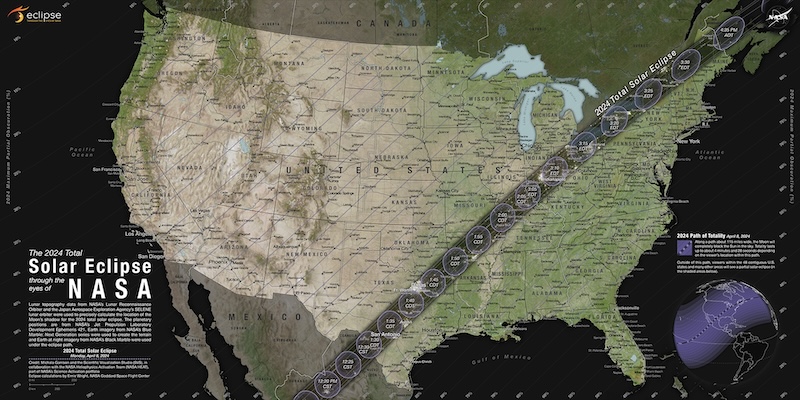The answer to that question in a growing number of districts is yes, students will have the day off to watch this spring’s total solar eclipse—that’s if the event visible over their hometowns. You’re out of luck if you’re in, say, California or Florida.
The moon will fully block the sun on April 8, and the eclipse will first be visible (weather permitting) in southwest Texas around 12:30 Central time, according to NASA. It will then cross parts of the Midwest and New England throughout the afternoon, passing over:
- Dallas around 1:40 p.m.. Central time
- Indiana and Ohio, 3:15 p.m. Eastern time
- Western New York, 3:20 p.m., Eastern time
- New Hampshire and Maine, 3:30 p.m., Eastern time
The total eclipse will be visible for about two to four minutes, with partial views lasting over an hour in the locations where it can be seen. The total eclipse will also be seen in Oklahoma, Arkansas, Missouri, Illinois, Kentucky, Pennsylvania and Vermont, and in small parts of Tennessee and Michigan.
More from DA: Want students to be more engaged? Don’t ban cellphones!
“For the first time in 200 years, Ohio will be in the path of the total eclipse,” Akron Public Schools said, announcing it had added ‘Eclipse Day,’ April 8, to its spring break. “The last time the sky went dark in the state was in 1806. Suffice to say, this is a big deal.”
The New Hampshire state Legislature, declaring the total solar eclipse to be “a once in a multi-generation educational opportunity,” has just introduced a bill making April 8 a school holiday throughout the state. Nearly 100 districts in Arkansas will close, according to the state’s Department of Education.
The Penfield Central School District near Rochester, New York, decided last spring to cancel classes on April 8. And way back last summer, students in Ohio’s Amherst Exempted Village Schools wrote a batch of letters to their school board asking for April 8, 2024, off. Their wish was granted, Fox 8 News reports.

Other large districts giving students the day off include Buffalo Public Schools in New York. Superintendent Tonja M. Williams called the event historic in a message to families and added that another reason she was canceling school was because the eclipse would occur during dismissal time. Western New York is also expecting an influx tourists to add to the afternoon traffic congestion.
In Texas, smaller districts in the path of the solar eclipse are closing. Liberty Hill and Marble Falls ISDs are giving students the day off while Austin ISD will be in session with educational activities scheduled around the eclipse, KXAN reports.
The next time a total solar eclipse will be visible in the contiguous U.S. is Aug. 12, 2045. It will cross over much of the south, the Rocky Mountains and parts of California—all regions which not have a great view of next year’s blockage of the sun.



